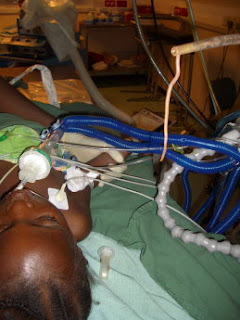Nigel writes:Another problem faced in Africa is the huge need. In Malawi, the hospital I worked in treated children with orthopaedic deformities and also burn contractures. Here in Liberia, we treat similar conditions including facial tumours and malformations, vesico-vaginal fistulas (VVF), thyroid tumours, hernias and cataracts, both in adults and children. A lot of what we see here are pathologies we rarely, if ever see in the West. This is usually as a result of the lack of clean running water and basic medical care. Some examples are:
 1. Club Feet
1. Club Feet – a congenital condition where the foot is turned in and if not corrected the child learns to walk on the outside aspects of his feet. At home this would be treated by a series of casts over the first few months of life. Left untreated, it involves complex surgery followed by months of intensive physiotherapy.
 2. Facial Tumours
2. Facial Tumours – Often these are benign but grow dangerously throughout the mouth and face. They can affect eating, breathing and threaten eyesight, not to mention the hideous disfigurement and smell that they produce, destroying not only tissue but the person’s self esteem.
 3. VVF
3. VVF – Due to a long and protracted labour where the baby is obstructed in the mother’s pelvis, the tissues in the bladder and urethra become compromised of their blood supply and die. After a few days, the mother delivers a dead baby. Later, a fistula or opening occurs between the bladder and the outside world so that the woman is now incontinent of urine and becomes outcast from her husband, family and community. Good obstetric healthcare can stop this from happening. Worse still perhaps, in Liberia, 1 in 16 mothers die in childbirth, 1 in 2500 in the US, and 1 in 29,800 in Sweden.
 4. Noma
4. Noma (cancrum oris) - is derived from the Greek meaning “to devour”. It is an opportunistic infection promoted by extreme poverty. It could be treated with an antibiotic as simple and cheap as penicillin. The peak incidence is in malnourished children aged 1-4 with a mortality of around 80%. Survivors are subject to disfigurement and disability caused by soft tissue and bony damage –some are missing lips, cheeks and even noses. This condition was last seen in Europe in prisoners of the concentration camps of the second world-war.
 5. Burns
5. Burns – severe burns are common in Africa. Most cooking takes place over charcoal fires and since many places have no electricity, light is provided by candles and lanterns. Children are especially vulnerable. The aim is to correct the healed contracture so eyes can blink again, mouths open and elbows and knees move once more.
 6. Cleft Lips and Palates
6. Cleft Lips and Palates are common all over the world. They are repaired in the first year of life but the outcome is not purely cosmetic. The repair promotes feeding, speech and development of teeth. Apparently it is not uncommon in West Africa for such babies to be buried soon after birth by local witch doctors in an attempt to kill the perceived “bad spirits”.
 7. Cataracts
7. Cataracts in children are often congenital in nature or sometimes due to infection. If left, the sight of the child will never develop. In adults with this condition, one becomes slowly blind, reliant on family members and walking aids.
With all of these problems, the person becomes marginalised by their community. They may look unsightly. They may even smell from their fungating tumour or constant leak of stale urine. Often considered to be possessed by an evil spirit, they become more and more outcast in a society where survival is hard enough for the able.
 Guess who is front line NHS (National Health Service) staff for the impending swine flu epidemic?
Guess who is front line NHS (National Health Service) staff for the impending swine flu epidemic?
 Yes, folks...this is the only effective mask that actually keeps most of the germs out. It took the hospital half an hour just to properly fit it to each staff member.
Yes, folks...this is the only effective mask that actually keeps most of the germs out. It took the hospital half an hour just to properly fit it to each staff member.
 Sort of sexy, don't you think?
Sort of sexy, don't you think?








































